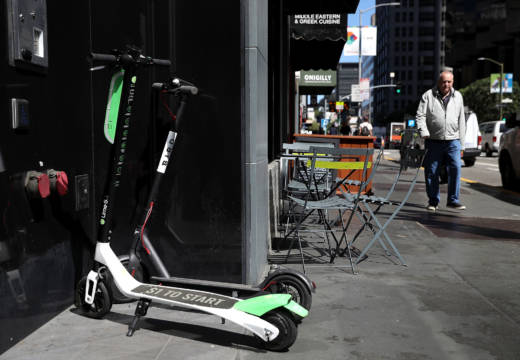Beyond those perhaps not-so-self-evident truths — expressed by board members, company representatives and dozens of city residents who shared their thoughts — one incontrovertible fact emerged from the hearing: Regulation is coming, sooner rather than later, for the scooter companies.
If you haven’t been hanging on every twist and turn of San Francisco’s #ScooterWars, here’s a recap:
Three companies (Spin, LimeBike and Bird) distributed hundreds of their stand-up scooters in the city beginning about a month ago: They didn’t ask permission, because while the city had made it clear it was working on regulations, none were in place. But the companies have become the target of rampant complaints about users riding on the sidewalk (illegal), dumping scooters haphazardly on sidewalks (illegal) and riding without helmets (illegal). The complaints have resulted in city action, with the Public Works agency seizing dozens of scooters and City Attorney Dennis Herrera sending the firms cease-and-desist letters on Monday demanding they curb their “unlawful business practices.”
So now that we’re caught up: Rules for the three companies already operating in the city, and for other firms that might want to join the fray, are on the way. What will they look like?
Monday’s hearing — held by the board’s three-member Land Use and Transportation Committee, which unanimously passed a scooter regulation ordinance from Supervisor Aaron Peskin — yielded a few clues.
Jamie Parks, head of the San Francisco Municipal Transportation Agency’s bicycle program, told the hearing the agency has been working on regulations and a permit program since late February.
Parks said that draft regulations, including a proposed permit application, will be presented to the agency’s board on May 1. The SFMTA could begin processing applications by mid-May.
The regulations will include “really detailed placement guidelines for where you can and cannot park,” Parks said, and will require companies to show they can meet those requirements.
But of crucial interest to the scooter companies and the public, it’s still an open question exactly how many companies will be permitted to operate and how many scooters they’ll get to put on the streets.
“All the numbers are being worked out,” Parks said. “Probably more than one permit would be issued with a cap on the total number of permits and the total number of scooters.”
He added that the regulations will require detailed usage data from permitted companies so the SFMTA can do “a thorough evaluation” of how the scooters are used and whether they are actually replacing car trips in the city.
Supervisor Jane Kim, a committee member, asked whether it would be possible to create formal docking areas for the scooters.
“I just think they’re so easy to tip over,” Kim said. “That is the part that really gets to me — that they’re just strewn all over the streets. And already in the first week I saw a number of them tipped over.”
Parks was noncommittal about what the SFMTA might do about the tipping problem and suggested the answer would come from the scooter firms themselves.
“We would put the onus on the companies to come to us with a solution,” Parks said. “… We’re not the experts on that. They need to come up with a way that their operations don’t impact public safety.”
Peskin’s scooter ordinance is expected to win quick approval from the full Board of Supervisors. Taking effect in late May, it would make it illegal for any company to distribute scooters without a city permit.
